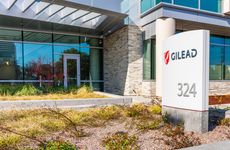
NEW YORK – Gilead Sciences has big plans for its TROP2-directed antibody-drug conjugate Trodelvy (sacituzumab govitecan), which ranked among its top-selling precision oncology drugs in Q2 2023 with 64 percent sales growth year over year, the company reported on Thursday.
For the three months ending June 30, Foster City, California-based Gilead's oncology unit brought in $728 million in revenue, up 38 percent from $527 million in Q2 2022. Total therapeutic product sales over that same period were up 7 percent to $6.56 billion compared to $6.14 billion. Excluding the impact of the COVID-19 treatment Veklury (remdesivir), product sales would have increased 11 percent year over year in Q2 2023.
Gilead's total revenues for the second quarter were $6.60 billion, a 5 percent increase from $6.26 billion in the prior year's second quarter, beating analysts' consensus expectations of $6.44 billion. Gilead attributed the more modest revenue growth to continuing declines in Veklury sales.
Sales of Trodelvy, which the firm markets for certain advanced breast and bladder cancer patients, meanwhile, rose to $260 million versus $159 million in the year-ago quarter. Trodelvy's growth reflects strong uptake in new patient populations. Just last month, the European Commission approved Trodelvy as a treatment for advanced, pretreated, hormone receptor-positive, HER2-negative breast cancer. The US Food and Drug Administration approved Trodelvy for the same indication in February.
The European Society for Medical Oncology includes Trodelvy as a category I preferred treatment for HR-positive, HER2-negative metastatic breast cancer patients. In the US, the National Comprehensive Cancer Network recommends Trodelvy as a category 1 treatment in this setting.
"We continue to be very pleased with the launch in pretreated, HR-positive, HER2-negative metastatic breast cancer with strong awareness of our approval in the US, [and] we look forward to reaching even more patients in Europe following last week's marketing authorization from the European Commission," Gilead Chief Commercial Officer Johanna Mercier said on a call to discuss the firm's second quarter financials on Thursday evening. She added that Gilead is beginning discussions about Trodelvy with health authorities in Japan and is planning to seek approval in metastatic triple-negative breast cancer later this year.
Gilead has been developing Trodelvy in non-small cell lung cancer, too. On the call, Gilead Chief Medical Officer Merdad Parsey said that in early September at the upcoming World Conference on Lung Cancer, Gilead plans to share data from its ongoing EVOKE-02 trial of Trodelvy plus Merck's checkpoint inhibitor Keytruda (pembrolizumab) with or without chemotherapy in first-line NSCLC. The preliminary readout will include data from the first two cohorts in the study, including NSCLC patients with PD-L1-high and PD-L1-low tumors.
Gilead also reported higher revenues from its autologous cell therapies during the quarter. Total cell therapy sales were $469 million in Q2 2023, up 27 percent from $368 million in Q2 2022. The CD19-directed CAR T-cell therapy Yescarta (axicabtagene ciloleucel) contributed $380 million to revenues in Q2 2023, up 29 percent from $295 million in the prior year's second quarter. Sales of Tecartus (brexucabtagene autoleucel) also climbed 21 percent to $88 million from $73 million in Q2 2022.
Looking ahead, Parsey said Gilead is encouraged by the potential outlook for its investigational anti-TIGIT agent, domvanalimab, which it is developing with Arcus Biosciences as a first-line treatment for patients with PD-L1-high NSCLC. Phase II data from the ARC-7 study showed that domvanalimab plus Arcus' investigational PD-1 inhibitor zimberelimab benefitted patients more compared to zimberelimab alone.
"These data form the basis for our domvanalimab program encompassing Phase III trials in first-line NSCLC and upper gastrointestinal cancers," Parsey said.
Gilead is also figuring out what to do with its anti-CD47 immunotherapy agent, magrolimab, following the shuttering of the Phase III ENHANCE study last month. Gilead discontinued that trial of magrolimab in high-risk myelodysplastic syndromes because it was unlikely that the study would meet its desired endpoints. However, the firm is still trying to develop magrolimab as a treatment for patients with acute myeloid leukemias harboring TP53 mutations, among other blood cancer indications.
"We will take a thorough, data-driven approach regarding next steps as we carry out the ongoing analysis of magrolimab," Gilead CEO Daniel O'Day said.
Gilead posted net income of $1.05 billion, or $.83 per share, for Q2 2023 compared to $1.14 billion, or $.91 per share, for Q2 2022. The non-GAAP diluted EPS was $1.34, below the $1.64 per share that analysts had estimated.
As of June 30, Gilead had $8.0 billion in cash, cash equivalents, and marketable securities.
Gilead increased its full-year revenue guidance estimating it will bring in between $26.3 billion and $26.7 billion compared to previous expectations in the range of $26.0 billion and $26.5 billion. Gilead now expects EPS in the range of $4.50 to $4.85, down from earlier guidance between $4.75 and $5.15. Gilead expects non-GAAP EPS in the range of $6.45 and $6.80 versus its earlier estimate of $6.60 and $7.00.
